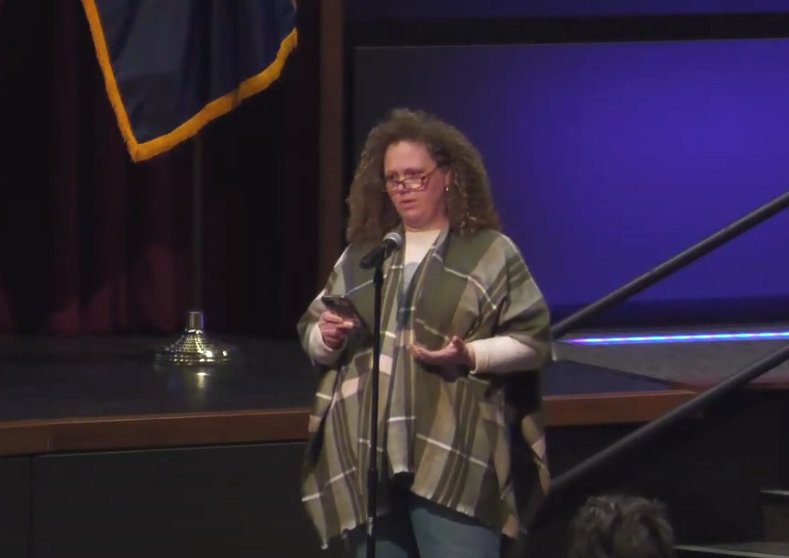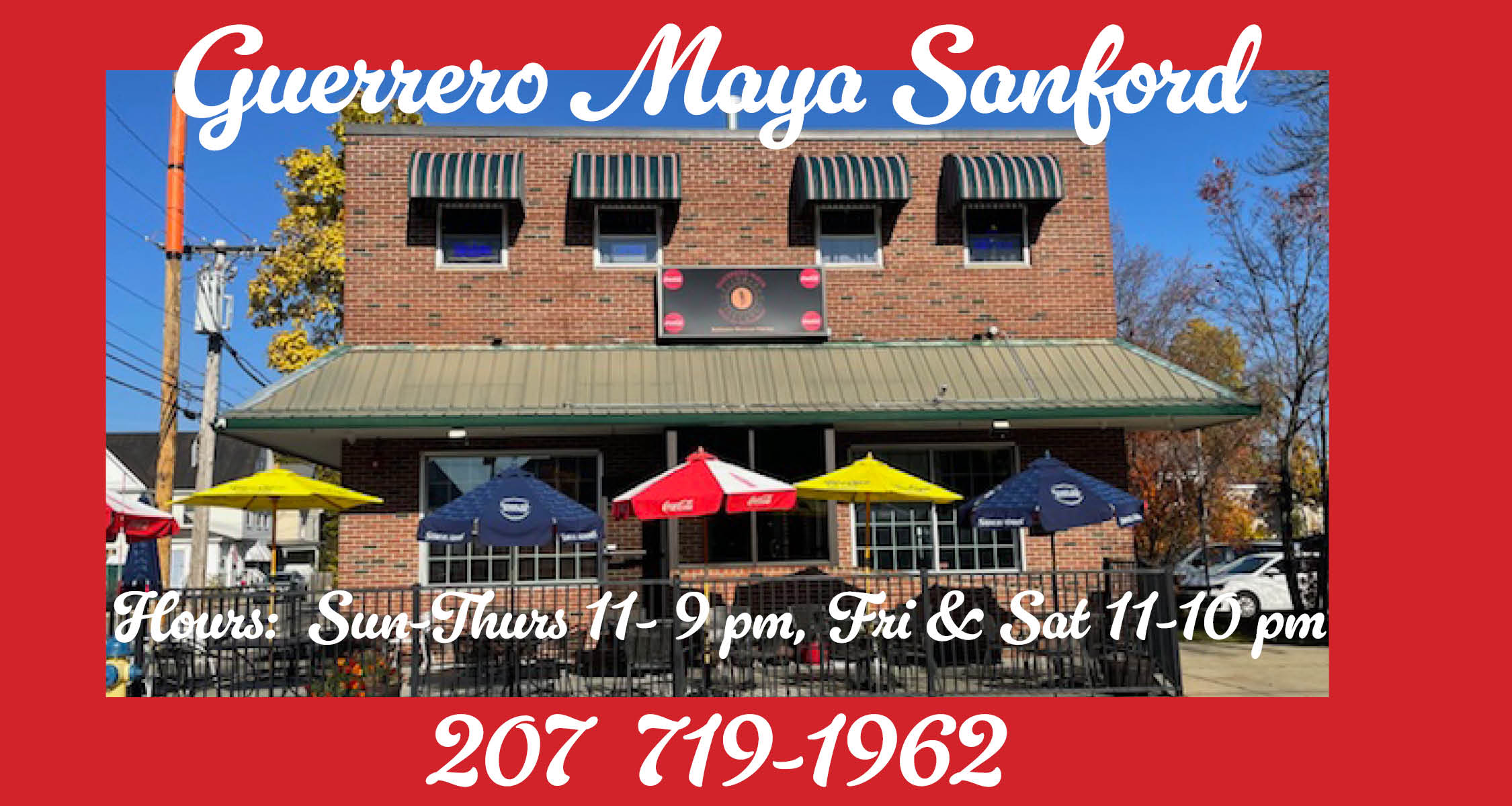Fire station bond draws mixed reviews from modest-size crowd
- October 11th 2024
- Public Safety

Jennifer Davie speaks to the crowd at Sanford Performing Arts Center
Photo: WSSR-TV
By Lee Burnett
Opinion was divided at a heavily advertised forum last week on a proposed $42.5 million bond issue to build two new fire stations. The Oct. 2 session lasted nearly three and a half hours and was punctuated by applause several times.
Eight people spoke in favor of the project: Dave Ouellette, Gerry Gay, Steve Benotti, Bruce Gordon, Anne-Marie Mastraccio, Jonathan Mapes, John Garvin and Zendelle Bouchard. Five people asked clarifying questions about specific aspects of the project: Bill Brink, Brett Williams, Lindsay Quinn, Steve Cabana and Shawn Goodwin. Some questions were pointed. Four people gave critical assessments: Jennifer Davie, Denise Cunningham, Dave Bowles, and Crystal Martell.
Several speakers noted the audience of about 150 people seemed small for the magnitude of the matter at hand. “This is not a big crowd,” said Bruce Gordon.
The City Council is proposing the project on the Nov 5 ballot to address longstanding substandard conditions at existing stations that are blamed for elevated incidence of cancer among firefighters, inequal facilities for women firefighters and weak recruiting pitch for new hires. If the bond issue goes down to defeat, backers say, the city could be subject to expensive lawsuits and federal sanctions.
Critics challenged some of the financial assumptions, the validity of cost estimates, the process of acquiring the land and the decision to package the two stations as one project.
The most tantalizing news of the night came from City Manager Steve Buck who disclosed that the city is pursuing new commercial development that, combined with a law change, could ease the burden of new bonding.
“I know we have a $120 million industry that has done site selection in Sanford right now,” Buck told the audience. He did not disclose details of the investment, which he said would provide enough new tax revenue to cover debt payments. But Buck acknowledged that it could only be applied to fire station bonding if state law is amended to allow tax payments within a tax increment finance district to be earmarked entirely toward public safety projects, he said. Buck has previously sought changes in the current 15 percent limit, but timing might be more favorable now.
Jennifer Davie asked why the city didn’t pursue less expensive construction of facilities for paramedics that don’t require decontamination facilities, since the majority of calls are medically related. Chief Susi said the facilities would still have to be built to the same standard and if medical-only, stand-alone facilities were built, that would mean four stations instead of two.
Gerry Gay said, “the time is now” to address safety deficiencies that have been “ignored for 40 years.” “The cancer issue has been a huge issue for years with me,” he said.
Former State Representative David Bowles criticized the city council for delaying addressing the issue until a year when a tax increase was approved. “It was absolutely unconscionable for the council to have approved a nine percent increase in taxes for the current year when you knew this would likely result in significant cost increases down the road,” he said.
Lindsay Quinn asked about the accuracy of the price if the buildings have yet to be fully designed. Architect Rob Frank said the recently completed Brunswick fire station built to the same safety standards provides reasonably comparable costs.
Brett Williams asked if the financial impact of the bonds would be compounded by higher insurance rates on homes that lie outside of a four-minute-response-time zone. Chief Scott Susi said there shouldn’t be any significant insurance impact because the city’s overall insurance rating was recently reevaluated and upgraded to a better classification through the Insurance Services Office.
Denise Cunningham and Crystal Martell both questioned why voters aren’t being given an option of voting for a single station. Cunningham pointed out that taxpayers would be taking a double hit this year. “I’m looking at a $600 increase,” she said. “In my realm, people can take one [station] but not two.” Fire chief Susi said a single station wouldn’t provide adequate coverage for the entire city without excessive response times. The two proposed stations have been strategically located for maximum coverage as determined by mapping of historical call data.
Steve Cabana suggested savings could be achieved by switching to an all-steel building and by eliminating a medical room. He said there should be a “Plan B” for next year should the bond measure fail and sought reassurances that any grant money received would be applied to reduce bonding cost rather than create add-ons. Buck said the terms and conditions of the grant would be specified as such.
The most dramatic comments came toward the end from retired fuel business owner and former school board member Jonathan Mapes, who had paid for a mailing of 5,000 glossy cards to boost attendance at the forum. At the outset, he bemoaned citizen apathy and chided city leaders for what he considered insufficient outreach effort, which drew an immediate retort from Mayor Becky Brink. He continued.
“This isn’t about the first responders … This is a tax issue,” he declared. Mapes recounted his efforts to educate himself, which included an hour-long meeting with chief Scott Susi and tour of the central station. “I don’t know how you attract anyone to work there, it’s terrible,” he said. Mapes expressed his worry about rising labor costs and potential other bond issues.
“Taxes are going to go up. They always have and they will continue to go up.” Mapes praised the questions asked and the explanations provided, then provided his conclusion.
“I don’t have any questions, at this point in time,” he said, shifting the papers in his hand. “I’m good. I’m supportive.” Brink congratulated him for keeping an open mind and educating himself about the project.
John Garvin questioned why the city plans two bid openings, rather than combine projects in a single bid offering. Architect Frank acknowledged the benefit of getting a “good handle” on costs in the first project that could be applied to the second project. However, he warned of the danger of getting much higher bids asking a contractor to bid on two projects at once, knowing one wouldn’t begin for 15 months.
Shawn Goodwin asked about contingencies should bids come in “way over” budget. Frank said his firm has a “very good track record” of projecting costs and said there has been “only one project out of a 150 that surprised us.”
The biggest applause was for remarks by Zendelle Bouchard, who first warned that the Occupational Safety and Health Administration would soon be enforcing stiffer regulations on all fire departments. “This project really is not optional,” she said, “The only question is … do we do it now, or do we wait and do it later for more money?” She also raised the possibility of civil rights lawsuits “that could make forty-two and a half million look like chump change.”
Bouchard said passing the bond this year is not just the least of expensive options, but also “the right thing to do. They take care of us on the worst days of our lives,” she said, “and it’s time we took care of them.”






